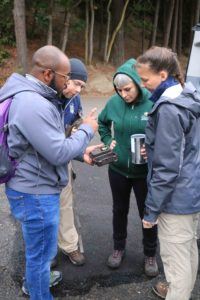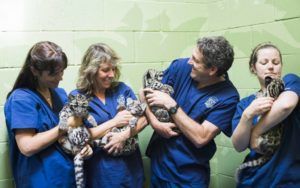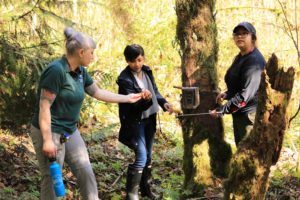Sister zoo Point Defiance Zoo & Aquarium has won two significant awards from the Association of Zoos & Aquariums, announced today at the 2020 AZA online conference. One is shared with Northwest Trek Wildlife Park.
The prestigious Edward Bean Award was given to Point Defiance Zoo in collaboration with the National Zoo’s Smithsonian Conservation Biology Institute and the Nashville Zoo for its work in breeding endangered clouded leopards.
The award, which goes jointly to all three zoos as members of the Clouded Leopard Consortium, is in the Innovation category, and recognizes outstanding efforts in breeding that either significantly enhance the population of a species, or represent a breakthrough in strategies that help create zoo and aquarium populations.
 The Research Award for significant achievement in animal science research was given to the Urban Wildlife Information Network, a multi-city research effort coordinated by Lincoln Park Zoo’s Urban Wildlife Institute to which both Point Defiance Zoo and sister zoo Northwest Trek have contributed research as part of their Grit City Carnivore Project.
The Research Award for significant achievement in animal science research was given to the Urban Wildlife Information Network, a multi-city research effort coordinated by Lincoln Park Zoo’s Urban Wildlife Institute to which both Point Defiance Zoo and sister zoo Northwest Trek have contributed research as part of their Grit City Carnivore Project.
Both awards were presented virtually during the Honors and Awards ceremony at the AZA National Conference today.
“It is an honor to be recognized for our work in these two fields,” said Alan Varsik, director of the Zoological and Environmental Education Division of Metro Parks Tacoma, which includes Point Defiance Zoo and Northwest Trek. “Partnering for nearly two decades in the Clouded Leopard Consortium, we have enhanced reproductive methods for this extraordinary species, increased awareness of its conservation challenges, and inspired people to take action to help save it in the wild.
“More recently, our collaboration with the University of Washington Tacoma and the Urban Wildlife Information Network has advanced our knowledge of how urban wildlife and humans coexist.”

The Clouded Leopard Consortium began in 2002, when the three U.S.A. zoos, along with the Clouded Leopard Species Survival Plan (SSP), agreed to seek out a formal partnership with the Zoological Parks Organization of Thailand to benefit species breeding and research, partnering specifically with the Khao Kheow Open Zoo (KKOZ) in Chonburi. Thailand.
The partnership helped Thailand protect and conserve a beloved native species while building its own breeding capacity. The U.S.A., meanwhile, was contributing to conservation in Asia while helping breed zoo-based clouded leopards, so that some cubs could be imported to diversify and strengthen the U.S.A. clouded leopard population. The partnership also enhanced animal welfare for animals in human care, and shared expertise to build conservation capacity for this endangered species.
Since that time, the Consortium has built a successful conservation breeding program, including 17 clouded leopard cubs born at Point Defiance Zoo alone. A groundbreaking program of artificial insemination has led to many more cubs, as well as veterinary staff sent annually for the past seven years to train Thai veterinarians in AI.
“The Clouded Leopard Consortium is a successful conservation breeding program that generates new knowledge and best practices to enhance husbandry and reproduction for felids,” said Dr. Karen Goodrowe, general curator at Point Defiance Zoo, who has helped lead the partnership since it began. “I am very proud of this award and it’s a great example of people working together to enable species conservation to occur.”
Clouded leopards are rare and endangered. Ranging through Nepal, Sikkim, southern China, Sumatra, Thailand and Borneo, the rainforest habitat is being cut down at the world’s fastest deforestation rate (around 1.2% yearly) for logging, human habitat and to grow palm oil, a common food product.
Point Defiance Zoo & Aquarium is currently home to eight clouded leopards, who live in the Asian Forest Sanctuary and Wild Wonders Outdoor Theater habitats.

The Grit City Carnivore Project, which was recognized by the AZA 2020 Research Award, launched in fall 2018 to study the interrelationship between urban carnivores and humans. It is part of the Urban Wildlife Information Network, a partnership of researchers across the country who use standardized wildlife-monitoring protocols to understand the ecology and behavior of urban wildlife species. By pooling data across multiple North American cities, the network is seeking to understand why animals, such as coyotes, in different cities behave the way they do, and what patterns hold true across the continent.
Led by Dr. Christopher Schell, assistant professor of urban ecology at the University of Washington Tacoma (UWT), teams from both Point Defiance Zoo and Northwest Trek set up camera traps around greater Tacoma. The cameras were set to pick up animals moving nearby. Four times a year since then, the teams have retrieved the thousands of images, sorting and labeling them for study by the Schell Lab that includes topics of ecological health, effects of COVID-19 and how biodiversity and racism are linked.
The project has also included community outreach and surveys about human attitudes towards urban wildlife, with the ultimate goal of promoting all species living in harmony.
“It’s a perfect partnership,” said Karen Povey, conservation engagement manager for both zoos. “We can combine our skillset of community engagement, science data collection and storytelling with UWT’s science strengths. We want to foster feelings of wonder and stewardship, rather than fear.”